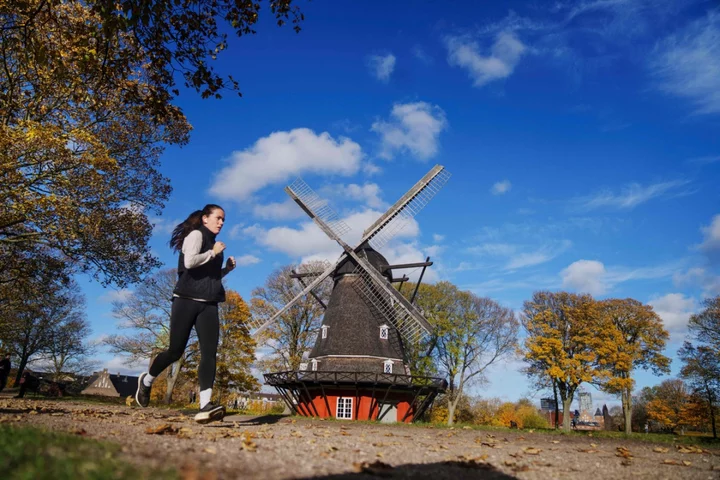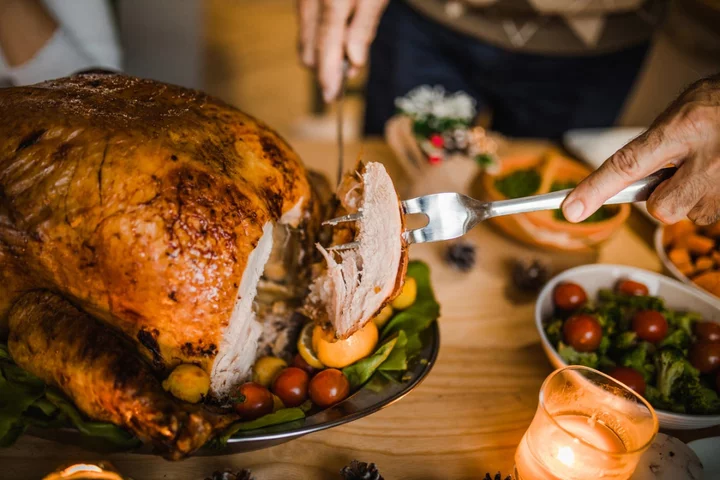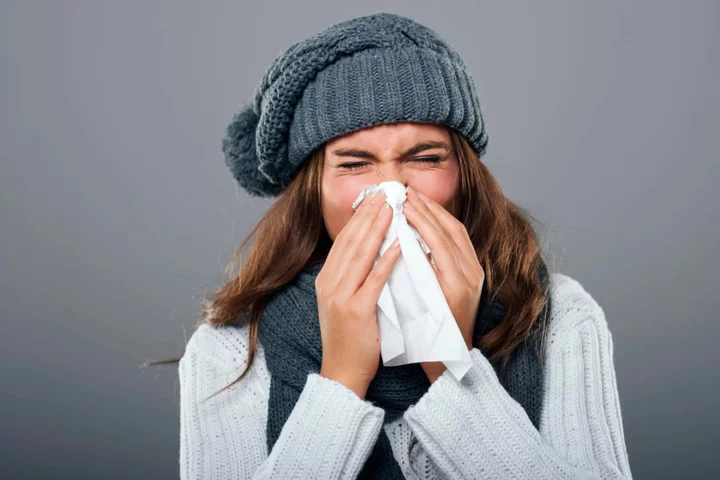
‘Smelling a mince pie could kill me’ says woman allergic to Christmas scents
A woman so allergic to the scent of Christmas that even “smelling a mince pie could kill [her]” almost died after a festive trip to a garden centre sparked an asthma attack. Anne Murray, 61, an engineer who lives alone in Lanark, Scotland, was diagnosed with severe asthma as a baby and has been allergic to traditional festive staples such as citrus and cinnamon since she was a child. According to the NHS, severe asthma means the condition is uncontrolled even when sufferers are taking their medication. When they are exposed to an allergen that irritates the airways, it can trigger asthma symptoms. Murray realised the seriousness of her condition at the age of 11 when her mother, Mary, collapsed and died from an asthma attack at the age of 34. Seven years later, Murray’s childhood best friend, Julia, also died from an asthma attack. Both deaths made her “live life to the full” and she has since done a bungee jump and travelled the globe. Murray had a near-death experience herself in November 2016 when she smelt “pine cones impregnated with citrus” in a garden centre. “I had difficulty breathing,” she recalled. “I grabbed my inhaler and ran quickly out of the garden centre.” On the drive home, her condition worsened. “It felt like someone was sitting on my chest.” Once home, she used her nebuliser – a device that enables her to breathe by giving her medicine as a mist – but could not get to sleep that night as she kept coughing, and whenever she laid down, it felt like she was “choking”. Two days later, and still struggling to breathe, she visited her GP and was barely able to stand up. An ambulance was called straight away, and Murray was given oxygen and strong nebulisers, before returning home with seven days’ worth of steroids. “They all told me it was a close call so it was lucky I had my nebuliser on me.” Since that incident, Murray has finished her Christmas shopping by September to avoid being near festive smells in shopping centres, and often turns down invites to Christmas parties. “It can be quite isolating,” she says. “If friends want to go out around Christmas, I have to ask them to go to different places where I know are safe. I can’t eat or be anywhere near things that smell like Christmas, or eat anything Christmassy like mince pies and stollen cake – I don’t touch them with a 10-foot barge pole. Just smelling a mince pie could kill me. So many things have Christmassy spices that you wouldn’t normally think of, too.” Following the dual losses of her mother and best friend, Murray learnt that she would have to make day-to-day adjustments to her life in order to maintain her own safety. When travelling, she often has to call the airline in advance to request that passengers only eat or peel oranges once they get off the plane. She also has to inform all her work colleagues not to wear festive perfume in the office. “I wish shops would put up signs saying they have festive scents in store,” she adds. “It would be so helpful for me, and stop them getting complaints too.” Today, she makes sure to keep her own Christmas planning low-key. “I don’t go anywhere near supermarkets and that sort of thing – it’s not worth the risk,” she says. “It can be embarrassing a lot of the time – if I go to a restaurant and tell them about my allergies, I get turned away and we have to find somewhere else to go. Or, I get loads of staff around me and I just don’t want the attention.” This year, Murray is looking forward to spending Christmas Day alone and visiting her dad, Archie, and stepmum, Alice, in Scotland. She says: “I still like Christmas, and I’m excited to be on my own this year – I can put my feet up and watch the telly, and eat whatever I want.”
1970-01-01 08:00

UK study finds this lifestyle change can add whole decade to life
Shifting to a healthier diet – and sticking to it – can add almost a decade to life for middle-aged people, a new study finds. The research published earlier this week in the journal Nature Food, assessed the health data of nearly half a million British residents whose eating habits have been documented as part of the UK biobank study. Researchers grouped 467,354 participants based on their eating habits and observed how these changed over time. Participants were grouped as either average and unhealthy eaters, or as people with food intake matching the UK’s Eatwell Guide and those whose diet matched what the researchers called the “longevity diet”. Currently, the UK population has a life expectancy at birth of about 84 years for women and 80 years for men. Adjusting for other contributing factors like smoking, alcohol, and physical activity, the study found that 40-year-old men and women who changed from an unhealthy diet to eating healthier food, and adhered to it, gained almost 9 to 10 years in life expectancy. “Here, using a prospective population-based cohort data from the UK Biobank, we show that sustained dietary change from unhealthy dietary patterns to the Eatwell Guide dietary recommendations is associated with 8.9 and 8.6 years gain in life expectancy for 40-year-old males and females, respectively,” scientists, including those from the University of Bergen in Norway, wrote. “In the same population, sustained dietary change from unhealthy to longevity-associated dietary patterns is associated with 10.8 and 10.4 years gain in life expectancy in males and females, respectively,” they added. Researchers say the longest gains in life expectancy were made by those changing their diets to consume more whole grains, nuts and fruits and less sugar-sweetened beverages and processed meats. Those who initially followed an average diet and later changed to healthier eating habits were found to have smaller life expectancy gains. “The bigger the changes made towards healthier dietary patterns, the larger the expected gains in life expectancy are,” researchers explained. The life expectancy gains also seemed to be lower when the diet change was initiated at older ages, but even these are substantial, scientists say. For instance, they say, even 70-year-olds can manage to extend their life expectancy by 4 or 5 years if they make a sustained diet change. The latest findings point to government actions that could contribute to people’s health improvements in the UK, such as health-oriented food taxes, improving food environments in school and working places, as well as subsidies to reduce the cost of healthy foods. “Such policy measures, informed by the up-to-date estimates on potential gains in life expectancy that we provide in this paper, could guide the deployment of resources to improve healthy eating patterns across the population,” researchers added. Read More Smoking causes 150 cancer cases every single day in UK, study finds Binman shoots first Hollywood film after chat with Mark Wahlberg changed his life ‘I could have gone blind if I hadn’t been able to go private’ ‘I could have gone blind if I hadn’t been able to go private’ Paul Rudd says ‘horrible’ Marvel diet left him drinking sparkling water as ‘reward’ How to celebrate Thanksgiving when you’re not close to your family
1970-01-01 08:00

When AC Milan tried & failed to sign Lionel Messi
Paolo Maldini reveals AC Milan's attempts to sign Lionel Messi.
1970-01-01 08:00

F1 rumors: Lewis Hamilton pursued an earth-shattering team-up with Max Verstappen, Red Bull
Lewis Hamilton tried to create a true Formula One superteam by teaming up with Max Verstappen and Red Bull.
1970-01-01 08:00

Biden administration defends West Point's race-conscious admissions policy
By Nate Raymond The Biden administration on Wednesday urged a federal judge to reject a legal challenge to
1970-01-01 08:00

Argentina's Milei taps new YPF chief in one of first major decisions
By Eliana Raszewski BUENOS AIRES Argentina's President-elect Javier Milei selected a senior energy executive to lead state oil
1970-01-01 08:00

'There's no money': Argentina's Milei doubles down on economic shock therapy
BUENOS AIRES Argentina's libertarian President-elect Javier Milei is sticking by his plans for economic "shock" therapy to fix
1970-01-01 08:00

How to celebrate Thanksgiving when you’re not close to your family
Thanksgiving is only a day away and most Americans have solidified their family plans for the holiday. Whether you’re hosting the big meal or heading to a relative’s house, the holidays are often a chance to reconnect with loved ones. However, Thanksgiving Day isn’t always a family-oriented occasion. Over the years, several studies have found that the seemingly joyous holiday season isn’t always easy for everyone. In a survey conducted by the AARP Foundation in 2017, 31 per cent of respondents said they felt lonely during the holidays throughout the last five years. Meanwhile, 41 per cent of participants were concerned about a family member or friend feeling lonely around the holidays. In 2020, a survey conducted by ValuePenguin also found that 70 per cent of respondents struggled with different types of loneliness before Thanksgiving and Christmas, partly due to the effects of the Covid-19 pandemic. While socially-distanced holiday parties have mostly become a thing of the past since then, there’s still many reasons why some people spend the season by themselves. Some Americans have family members living on the opposite side of the country, or world, while others may not have a close relationship with their relatives at all. There’s no one concrete way to spend the holidays, and everyone has their own reasons why they choose not to see certain people on Thanksgiving. Speaking to The Independent, Emma Mahony, a therapist at Better Life Therapy based in Pennsylvania, acknowledged that, when we spend the holidays alone, our feelings of loneliness can be heightened. While everyone experiences loneliness in a different way, Mahony believes that the feeling could be tied to how Thanksgiving has been portrayed over the years. “I think a lot of the anxieties and concerns that come up have to do with unmet expectations of what you think a holiday is supposed to look like, and what you think your relationship with your family or your friends is supposed to look like,” she said. “I think that’s where a lot of people themselves feel a little bit of a stressful state. Just maybe feeling a little let down by the expectations they have for themselves, after watching other people experience the holidays differently than them.” The holidays are often referred to as the most wonderful time of the year, but that doesn’t ring true for everyone. In some cases, the winter months can be quite a triggering time, and potentially a reminder to people of how they’ve been hurt by those closest to them. According to Mahony, the best way to manage those feelings of animosity is by creating your own perspective about the holidays and new ways to celebrate. “I think you should allow yourself to reframe it as: ‘Okay, how do I want the holidays to look for me? Who are the people that I do want in my life? Who are the people that I don’t want in my life?’” she advised. “Don’t try to make something that shouldn’t happen happen. Instead, recreate your own memories and your own traditions, and give yourself space and permission to do so. But also, if you know that it’s going to be a hard time for you, create that support system, from reaching out to a therapist or to a close friend.” For those who do have a close support system, it can make skipping out on Thanksgiving dinner a little easier. On the other hand, your cousins may miss sitting next to you at the dinner table. Still, Mahony believes we shouldn’t try to convince our family members to attend an event in which they’ve already opted out. “If someone decides they don’t want to be with you over the holidays, respect that choice for them,” she explained. “Don’t make them feel bad for prioritising themselves and their needs. [It] will potentially, you know, make things worse long term. I just honour that everyone needs to do what’s best for them, whether that be financially, emotionally, or physically.” Even if you decide to celebrate Thanksgiving this year without your family, it doesn’t mean that you’re entirely on your own. Mahony suggested setting up a Zoom call or FaceTime with some friends, or planning a fun meal if you’re worried about eating solo. “You could really do whatever you want, so I would set up things for yourself to look forward to,” she said. For those who are spending the holiday alone, but still want to take part in Thanksgiving-related activities, spend the morning or afternoon at a local homeless centre. You can continue the day by hosting a Friendsgiving dinner or movie night with your pals who are still in town. When it comes to food, you can cook a mini turkey for one or ditch Thanksgiving dinner altogether and order take-out at a local restaurant. Then, close out the night with some early Black Friday shopping online or in person. Although this Thursday is indeed a federal holiday, who says the day can’t feel like any other? Ultimately, how you spend Thanksgiving is entirely up to you and there’s no right or wrong way to celebrate the holidays. Remember that you shouldn’t be too hard on yourself for avoiding family during the holiday season. “If Thanksgiving looks different for you year after year, that’s okay. There’s not a specific way to spend the holidays and no family looks the same,” Mahoney said. “If you’re coming to terms with the fact that being with your family for the holidays isn’t what’s best for you, give yourself a little bit of compassion there. “It will get easier over the years, as you figure out how to take care of yourself better.” Read More Viral Thanksgiving guest mix-up continues tradition for eighth year How to watch Macy’s Thanksgiving Day Parade 2023 I made an air fryer Thanksgiving dinner so you don’t have to When do stores open and close on Thanksgiving and Black Friday this year? Why do Americans celebrate Thanksgiving? How to transport everything from turkey to cranberry sauce for Thanksgiving
1970-01-01 08:00

10 Worst MLB Contracts
The 10 worst contracts currently on the books in Major League Baseball.
1970-01-01 08:00

Fed up with catching colds? Here’s what your doctor really wants you to know
Already feel like you’ve had your fill of sore throats, coughs and stuffy heads this winter? Colds may be common and minor – but they can still leave you feeling rotten, not to mention being a major inconvenience. They aren’t really something you want to be traipsing to the GP surgery with either – but wouldn’t it be helpful to know what your doctor really thinks about managing winter ailments? We asked them… Getting ill is not always terrible Nobody enjoys having a cold, of course. But GP and TV medic Dr Hilary Jones – known for regular appearances on Good Morning Britain – says we can’t always “prevent exposure to viruses, especially in winter when people flock together for warmth indoors”. And if symptoms are mild, we probably don’t need to worry too much. “Let your own immune system deal with it,” says Jones. “That’s what your immune system is for – and looking on the positive side, the more you tickle up your immune system, the healthier it is. In a way, you’re stimulating your immune system to be healthy.” Antibiotics can be harmful if you don’t actually need them If symptoms are proving tougher to tolerate, it can be tempting to try antibiotics. But while there are certainly times when antibiotics are vital, they only work for bacterial infections, so taking them when you have a viral infection (such as a cold) is not only futile, but could cause harm. “Often, both clinicians and patients will be tempted to try antibiotics, even when there is little-to-no chance of them helping – ‘just in case’ and often accompanied with the reasoning of ‘what harm can it do?’,” says Dr Tom Jenkins, GP and developer of Centoreze Pelargonium. “We are now beginning to appreciate that there is potential harm at an individual level,” Jenkins adds. “There are more bacterial cells in the human body than human cells, and most of those bacterial cells are helpful and essential for healthy functioning. Because antibiotics are not selective and do not single out just bad bacteria, taking them upsets our bacterial microbiome, and we are now starting to learn about the subtle and sometimes lasting consequences of this.” Another major concern is bacteria becoming resistant to antibiotics – which the World Health Organisation (WHO) describes as one of the biggest threats to global health today. Tackling this is complex, but on an individual level, WHO guidelines suggest people only use antibiotics when suitable. Soothing home remedies are worth it Jones, who is working with Manuka Doctor, also points out: “If you do get sick, comforting symptomatic relief is really important, starting with the simple things. I’m an advocate of manuka honey – the genuine manuka honey from New Zealand, which carries a number for the antibacterial activity, the MGO methylglyoxal.” As well as its antibacterial properties, Jones says it’s “soothing for throats” and can provide an “energy boost” – plus his 97-year-old mother is a fan. “Not only does she put it in her porridge, she put it on her skin for a few lesions that she has – perfectly well-endorsed by the district nurse who comes to visit her as well. “You can also put honey in a grog, in hot water, with a bit of lemon, a bit of cinnamon – that’s something our grandmothers used to use, and to good effect.” The herbal remedy that’s doctor-approved There are so many natural remedies out there promising to fight off symptoms, and deciding between them can be overwhelming. But did you know there’s one herbal remedy that is recommended by the National Institute of Clinical Excellence (NICE) for managing certain upper respiratory tract symptoms? Pelargonium, licenced as a Traditional Herbal Remedy, is recommended by GPs to consider as one of four self-care treatment options for adults and children aged 12 and above. It’s mentioned on the NHS website’s page for coughs, too – along with getting plenty of rest, staying hydrated, Paracetamol and Ibuprofen where suitable for pain relief, and honey and lemon. Derived from plants found in South Africa and Lesotho, Pelargonium was widely used to help treat infections before antibiotics boomed. But “over the last quarter of a century”, Jenkins says , “clinical research has begun to revisit this forgotten treatment, especially in Germany, and now more recently here in the UK too.” This has “resulted in the publication of over 70 peer reviewed pre-clinical and clinical studies supporting its effect”, says Jenkins. He explains it contains “a large number of biological molecules” that work in a number of ways to “stimulate the body’s immune system to fight infections”. Diet and lifestyle do play a part “Diet is always important,” says Jones. “A healthy lifestyle does protect us and helps our immune system. Clearly there are obvious things not to do – smoking and excess alcohol – as well as poor nutrition. “We know vitamin D is important for good immune health, and there are many people who are deficient in vitamin D, who should be taking a supplement as recommended by the WHO and NHS, particularly through winter,” Jones adds (when there isn’t enough sunlight in this part of the world for our bodies to make sufficient amounts). “So vitamin D, adequate vitamin C, zinc, and sometimes things like garlic and echinacea can be helpful in making sure your immune system is healthy.” While a balanced diet comes first, Jones believes “it’s always worth considering a multivitamin, which gives you a little bit of everything, particularly if your diet is restricted or selective in any way or if you’ve got extra needs”, he adds. “But healthy eating, plenty of fruit and vegetables, adequate protein, exercising moderately and avoiding pollutants and cigarettes – those are the main things.” Check in with your doctor if you’re constantly rundown Still feel like nothing seems to help? Then it may be time to check in with your doctor. “If you’re concerned that you have any possible underlying medical problem, I would always advise discussing matters with your GP,” says Jenkins.“Sometimes recurrent infections can be a sign of an underlying infection, but sometimes they can be because you are rundown. Your GP is ideally placed here because they have your medical record, are able to look into things in more detail, and can follow you up.”
1970-01-01 08:00

Vintage Chanel evening coat sells for 312,000 euros at Paris auction
A vintage Chanel evening coat sold for 312,000 euros at the auction of socialite Mouna Ayoub's vast collection from the luxury fashion house in Paris.
1970-01-01 08:00

USMNT rumors: Pulisic is back, aggregate victory, Copa America final in Miami
Today's USMNT rumors include Christian Pulisic being set to return to AC Milan training, Gregg Berhalter's side win on aggregate against Trinidad and Tobago. Also, Miami will host the Copa America final.
1970-01-01 08:00
